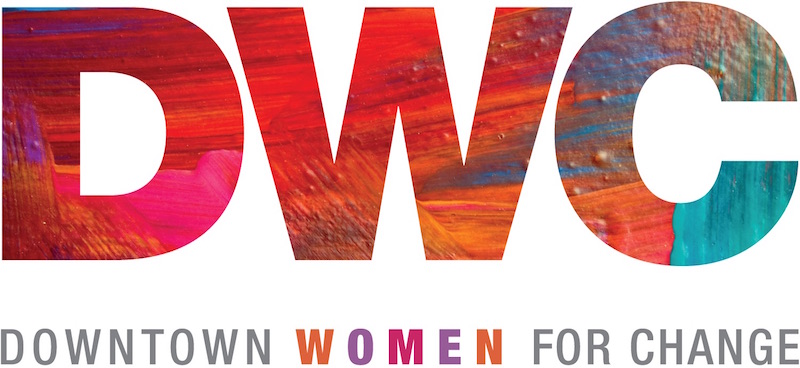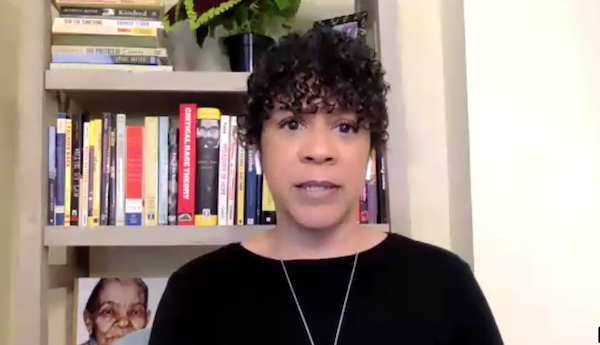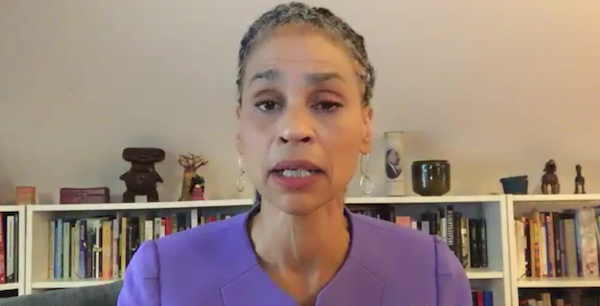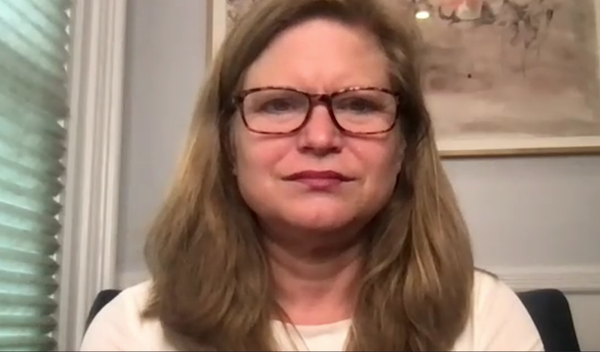
BY WINNIE McCROY | As rain loomed in the forecast on the gray Monday of May 3, the three New York City female mayoral candidates (out of 13 total candidates) took time to share their ideas of a sunnier future outlook, post-pandemic. Topics discussed included education, the NYPD, Open Streets, small business survival, climate change and the environment, and affordable housing. With the June 22 Primary Day offering rank voting options for the first time, the Big Apple might for the first time finally see a woman be elected mayor.
“We’ve all seen how New York City benefits when there are women candidates,” said moderator Kyra Tirana Barry of the event’s presenter, Downtown Women for Change, a grassroots advocacy organization committed to preserving and advancing rights for women and girls. Barry welcomed candidates Maya Wiley, Kathryn Garcia, and Dianne Morales.
Candidate Maya Wiley said her platform was “central to my experience as a black woman” in a society that still does not recognize women’s value—but she hoped to change that.
“I’m running because I know this city can be stronger, more fair, and more just, and I have plans to do just that,” said Wiley, adding that she was proud to be running with the endorsements of 1199 SEIU, Emily’s List, Amplify Her NYC, and Higher Heights.
A leader in city government and a social justice advocate, Wiley was the first black woman to serve as Counsel to the Mayor, and she held police accountable as Chair of the Civilian Complaint Review Board.
“I listened, learned, and led in partnership. I could show government how to be transformational,” she noted, describing how she helped low-income residents of Queensbridge Houses get free broadband Wi-Fi.
Kathryn Garcia, a lifelong New Yorker and former Commissioner for the NYC Sanitation Department, introduced herself as an adopted child with two adopted siblings, raised in a multiracial family led by civil servant parents.
“As we reopen and embrace society, we take another step in the right direction, getting people back to work and school,” said Garcia, who said that as a mom, she worried about kids facing depression from being separated from their friends and teachers. Garcia vowed to attack the long-term crises of affordability, housing, and environmental justice.
“I look to women as a back-up to any back-up plan in an emergency,” said Garcia, only partly kidding. “I have a plan for economic opportunities to provide young people coming out of school with ladders to success, so that we can continue to raise our children in a city we all love.”
“Women need to be in leadership positions,” said Garcia, speaking truth to power. “We bring so much lived experience on how to be treated, because we are often in a position where they don’t want your opinion, or when you say it it’s somehow different than when they say the same thing. Women are much more effective at building teams, inspiring people to work incredibly hard to reach goals, and have the skill set to execute their vision. I know how government works, and I’ve been in the trenches, delivering a million meals a day during COVID.”

Then came Dianne Morales, who described herself as a non-traditional candidate with bold ideas. She first vowed to honor and prioritize the frontline workers who have run the city during COVID, including grocery clerks, bus drivers, and delivery workers—of whom, she said, “79% were Black and Latinx, and 63% were women. They reflect 62% of our COVID fatalities, but often lack adequate access to healthcare.”
“We are at a crossroads in history, and it’s time to reckon with how the pandemics of these preexisting social conditions—lack of access to affordable housing, lack of employment, lack of quality education and healthcare—have wreaked havoc in communities of color,” said Morales. “Democracy never fully reflected us… but our system is not broken, it is working exactly how it was designed to work.”
“I’m running to build a politics for all people, because those in power have always held the power,” she declared. “Thoughts and prayers won’t create equality for us. We have unlimited possibilities for radical reimagining. We must reconcile with the past and confront the structures that made it. We must defend and protect human rights for every New Yorker. So I am not promising to get NYC back to normal—I am promising to build a new New York City that has never existed.”
ON THE TOPIC OF EDUCATION | Next, the candidates took a look at education, and the related issues of Gifted & Talented programs, Charter Schools, and specialized high schools. With an influx of funds coming to New York City after a year spent in COVID lockdown, Barry asked candidates how those funds would best be used.
“I advocated for my two daughters in public school… and let’s get one thing clear: We are at risk of losing a generation, but we don’t have to be, because we have resources,” said Wiley, who would use the funding to hire 2,500 new teachers. This would, she noted, bring class sizes down. Doing so, she asserted, would “improve education and make sure they are dealing with traumatized students, especially in communities with high levels of violence.”
Wiley also advocates eliminating discriminatory admissions practices, which she said “will increase outcomes and opportunities. We must design a system that works for every single child.”
Asked about the Gifted & Talented program, Wiley said after participating in Town Halls in every borough as co-chair of the School Advisory Group for the city, stakeholders were forced to admit that NYC was not at the cutting edge when it came to Gifted & Talented programs.
“It’s no program, all title, so let’s stop pretending,” said Wiley. “Let’s invest in the talents of our kids… and invest in opportunities for schools to innovate, redesign, and integrate Gifted & Talented programs.”
When it came to Charter Schools, Wiley said she wanted to create a resource center for education innovation, and expand what’s working, including Charter Schools.
“I’ll focus on all of the children in the Department of Education (DOE) system, and make sure every parent can feel good choosing a school for their children,” vowed Wiley.
Garcia focused first on using funding to address underserved families and moms. She’d fund childcare from 0-3 years old, and fully fund food programs, so no child is hungry. She also wants to expand enrichment programs—arts, theater, music, and sports—so all kids have the opportunities that help critical thinking as they grow.
Barry asked Garcia how she’d handle the DOE reporting to her as Mayor, with the fate of a million schoolkids in the balance. Garcia would first “move $130M out of the headquarters and into our schools.” She’d improve early childhood development, screen to address dyslexia and learning delays, and use a scientifically-based curriculum for reading. Garcia would provide those in higher grades with real learning and work experiences and give them financial literacy. She’ll also fight to get more kids into college, saying, “About 60% of jobs require some post-secondary credential, and in some neighborhoods only 20% of kids are getting that.”
When it comes to Gifted & Talented, Garcia believes, “Every child needs the opportunity for enrichment courses, and we need every teacher to meet kids where they are. Give them more help, and if they’re advanced, push them past their grade level.”
She also said we should stop looking at high schools as a scarce resource, and offer all kids a seat using their GPA, integrated racially and economically. Said Garcia, “I’d leave the current approach to specialized high schools, while focusing on expanding high schools across the city.”
Morales’ plan focused on partnerships with community-based arts and cultural organizations, saying, “We should create satellites out of these facilities that already have updated infrastructure (clean air filters, technology) and a staff familiar with supporting kids. We could expand the footprint of the DOE to bring in those spaces, and provide teachers with an increased sense of safety, and also of being heard by our city. We have eroded the trust with our teaching staff, and this is a mechanism to make them feel heard and expand our footprint.”
Children also don’t always see themselves reflected in the curriculum, said Morales noting, “We know it’s whitewashed to a harmful degree. We must recruit and train folks from community-based organizations. I’ve also called for moving the NYPD out of our schools and replacing them with a student support staff to nurture and allow children to grow. We must remove barriers to access that perpetuate the segregation of our schools, and make every school one a family would be proud to send their child to. Every kid is gifted and talented, and we need to find and nurture that gift.”
HELPING SMALL BUSINESSES | Barry then asked the candidates what strategies they would bring to the city to revitalize small businesses, which comprise half the city’s employers.
“This is critically important, because small business are half our jobs in the city, especially for women of color,” said Wiley. “It’s how they put food on the table—it’s certainly how my mother did after my father died.”
Wiley said she’d implement a small grants program for businesses with 10 employees or less and help them with back-debt, so they had a fighting chance to survive. She also wants to design programs around sole proprietorships and implement a “fee and fine” holiday, so that we can “make sure we support small businesses rather than choke them with red tape,” saying the city needs agencies to come together to make business easier to navigate.

Wiley also proposed creating an Office of Public Space Management, to maximize the livability of neighborhoods and make them more business friendly. With all of the excitement and energy around the Open Streets program, Wiley said people can’t see how some small businesses’ quality of life has been negatively impacted.
“It was messy how it happened, but I understand it was a crisis and we were going along. But the reality is, some store owners were harmed by Open Streets because they lost access to their business as a result,” said Wiley. “In addition, some couldn’t access Open Streets, because every community is different,” with the process frustratingly siloed in six different agencies, including Small Business Services, the DOT, and the Parks Department.
“This will streamline it through the Mayoral office,” said Wiley. “I have a mission, and that will include community engagement. It’s core to how I’ve always worked as a civil rights advocate, to create these processes as part of my decision-making process.”
Garcia took a more positive outlook on the Open Streets program, saying, “they were a real gift during COVID; they supported business and gave us a little joy when things were not so joyful,” noting that they increased economic activity 30% in the Meatpacking District.
“We also have to support small businesses, which comprise 50% of our private sector,” said Garcia. “We need to give them microloans and have a one-city-agency permit process, not six agencies, so they can focus on being entrepreneurs, hiring, and marketing–and the City needs to judge itself on how many businesses they open, not how many fines are given.”
Morales’ platform focused on fundamentally transforming systems. First, she said, we need to protect our most vulnerable—either by COVID-19 or income—and provide access to the vaccine in an equitable way. We must have trusted, credible community members to do the outreach and save people’s lives.
Next, said Morales, we must guarantee that the homeless and housing insecure have access to stable housing. “I will take on the system,” promised Morales. “The real estate market in NYC is driven by developers who determine what’s built where and get tremendous subsidies while our City gets a fraction of the returns. We need to invest those dollars at the community level and partner with affordable housing to convert vacant spaces like offices and hotels.
“Last thing I’ll say on this is we need to create a solidarity economy,” said Morales. “Small and mid-size businesses employ 50% of the NYC workforce, but we still focus on big box businesses as our saviors. I would invest in mid-size businesses first, and our care economy. It has become crystal clear that childcare workers and home health aides are the people that make it possible for us to live our lives, but are undervalued and under-served. We must invest dollars to expand and strengthen those sectors. If women have their childcare needs met, they can better be part of our workforce.”
THE NYPD AND PUBLIC SAFETY | Barry then turned to priorities and potential changes the candidates had for the NYPD.
“I will be putting the ‘public’ back in public safety,” said Wiley, who wants Mayoral control and civilian accountability with someone outside NYPD to lead that agency. She would also remove mental health crisis response from the NYPD purview.
Wiley wants the police to focus on the 30% increase in rapes, and invest in keeping women and girls safe. Garcia also mentioned the uptick in shootings, violence against AAPIs (Asian American Pacific Islanders), subway violence, and a serious distrust of the police.
“New York City can have a police force that’s respectful of everyone,” said Garcia. “My brother is black, and I feel deeply that everyone must be treated with respect. We must expand community policing. We must hire [police officers] at 25, have them live in the city, and train frontline sergeants so they go after community engagement, and not arrests. We must do real culture change—we need complete transparency on discipline, or we can’t rebuild trust. We also have to go after gun violence and violence against women. We can’t go back to the ’70s or ’80s, where I didn’t get on subways after dark, and had complex strategies to just survive walking down the street.”

CLIMATE CHANGE AND THE ENVIRONMENT | New Yorkers are interested in maximizing use of common areas, but they also want to keep green spaces green. Candidates discussed striking the right balance.
“The public realm is always intensely used,” said Garcia. “Pedestrians are the priority, but we also need spaces for art, culture, and commerce. I would expand bike lanes by 250 miles, but also make sure fire trucks and sanitation can get down the block. It’s possible if we think it out. And while we’re doing that, we need to green these blocks to make our air healthier.”
Garcia said we need a greener NYC, with a more robust public input process to protect from storm surges and heat waves “to confront climate change and make this a more livable city.”
Morales called for establishing a Green New Deal for NYC, and investing in a workforce training program targeted to the idea of a Green New City.
“That means partnering with CUNY to create training opportunities for community members who’ve lost work to take on roles in the city like retrofitting, energy efficiency, and infrastructure,” said Morales, proposing an Urban Climate Corps that would function like the Works Progress Administration.
Morales said it was necessary to implement standards and regulations around new construction so we are moving toward zero emissions, reducing and eliminating carbon emissions, and becoming the model in this country for what it looks like to create a green city.
“We can’t deny the damage we’ve done, but we can mitigate the harm,” she said. “All of this has got to be done through the lens of environmental justice. Some communities are disproportionately harmed by our practices and we must prioritize them.”
WRAPPING IT UP | The three female mayoral candidates, all of whom are mothers, left the Zoom audience with some parting words to think about the city we want to leave for our children.
“As someone running as a mother for the next generation of kids… this is the greatest opportunity for change-making that solves and fixes what has been broken,” said Wiley. “COVID laid bare the crises we were facing in affordability, mental health, and violence against women. I will run unapologetically as a woman, a black woman, and be explicit about how we pull together and fix what ails us.”
Garcia likened her helming the Department of Sanitation to leading the city. She said the time for the garbage of the past was over.
“It’s time for a woman to take that seat at City Hall,” said Garcia. “We are moms, but we are also leaders. I’ve been a leader, and never had a problem walking onto a Sanitation site in high heels and commanding my team. I think it makes you a more authentic person to the people you need to lead.”
Whether by “socialization or nature, women are caretakers,” noted Morales. “We bring less ego to the work and focus on the wellbeing of others and the collective good. If there was ever a time to focus on that kind of leadership, now is it. If you look around the world at those countries that navigated COVID better, to a T every single one is led by women. In our own country, women in government are much more effective at negotiating to get legislation passed. To me, that’s a function of prioritizing the larger community over our egos. We should all be ready to move away from that.”
Morales said she had more than 25 years’ experience meeting the needs of New Yorkers, being “from here, taught here, raised family and organized here.” She’s tired of seeing the food lines grow longer, while at the same time Wall Street gets stronger.
“These inequities deepen, and it’s time to shift our priorities and focus on those communities that need us most,” said Morales. “My vision is inspired by the people I’ve worked shoulder to shoulder with. I’m not afraid to challenge the status quo. Anything less is not good enough.”
ABOUT DOWNTOWN WOMEN FOR CHANGE | Downtown Women for Change is a grassroots organization founded by New York women committed to preserving and advancing women’s rights, supporting women and girls in the U.S., and working to elect progressive pro-choice women and our allies to political office. They are committed to creating a space where people are valued regardless of sex, age, race, gender identity, sexual orientation, ability, national origin or religious affiliation. To visit their website, click here.
Chelsea Community News is made possible with the help of our awesome advertisers, and the support of our readers. If you like what you see, please consider taking part in our GoFundMe campaign (click here). To make a direct donation, give feedback, or send a Letter to the Editor, email scott@chelseacommunitynews.com.

Pingback: รับทำ SEO
Pingback: resource
Pingback: นายหน้างานตกแต่งภายใน ให้ค่าคอมมิชชั่นสูง
Pingback: โถส้วม
Pingback: จัดสเปคคอม
Pingback: Fun Cup
Pingback: faceless niches
Pingback: Ks Quik 2000
Pingback: เว็บบอล Auto
Pingback: Going Here
Pingback: ป้าย
Pingback: ค่ายเกมสล็อตอาบาเนโรอ
Pingback: 주식선물
Pingback: Carpet Cleaning Herrin IL
Pingback: next
Pingback: เล่นบาคาร่า
Pingback: 토토샤오미
Pingback: เอสบีโอเบท
Pingback: DevOps Expert Consulting
Pingback: maxbet
Pingback: Official Gun Website
Pingback: check these guys out
Pingback: benelli r1
Pingback: Watch Bob Biswas
Pingback: คลิปหลุด
Pingback: plan cul
Pingback: good place to buy live cc
Pingback: nova88
Pingback: nova78 organic
Pingback: Smart Rack
Pingback: betvole giris
Pingback: relx
Pingback: belly dumps for sale
Pingback: VPS Hosting from $19.99
Pingback: سایت های شرطبندی تایید شده توسط پوکر ایرانیان